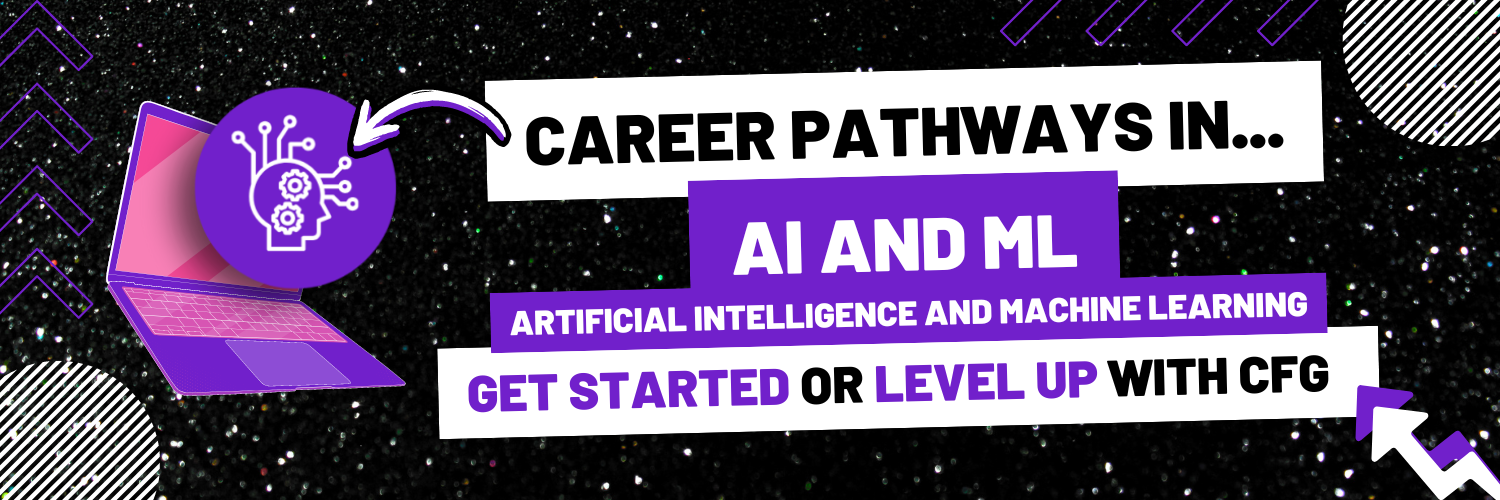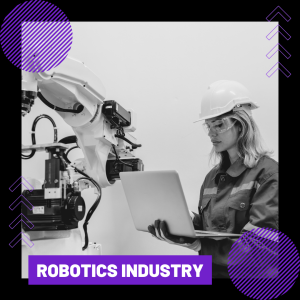
Content Menu
How to start and progress in a career in Artificial Intelligence and Machine learning
Starting a career in machine learning and artificial intelligence
Artificial intelligence and Machine Learning Engineers are more important (and in demand) than ever before! AI and ML Engineers play a crucial role in advancing the capabilities of artificial intelligence and machine learning applications across various industries, from healthcare and finance to robotics and automation. In short, their work contributes to developing intelligent systems capable of making informed decisions and predictions based on data. But before we get into the technical aspects of this career path, let’s first understand what exactly AI and ML are!
What is the difference between AI and ML?
Definitions of:
Artificial Intelligence (AI): AI is how machines (like computers and smart home systems) can perform tasks that usually need human intelligence, such as understanding language, answering questions, and recognising patterns.
Machine Learning (ML): ML is the process of how computers grow smarter over time by learning from the data they receive, improving their performance, much like how humans learn from experience, without needing to be explicitly programmed for every task.
However, together, according to Google Cloud, “AI is the broader concept of enabling a machine or system to sense, reason, act, or adapt like a human. ML is an application of AI that allows machines to extract knowledge from data and learn from it autonomously.”
If you still need a simpler explanation here we go:
Think of AI (Artificial Intelligence) as a super-smart assistant that can learn, understand, and help you solve problems, like a personal guide that gets better with experience (i.e. Siri on your phone or Google Pixel’s Gemini assistant).
Machine Learning (ML) is how this assistant learns—it’s like teaching it to recognise patterns, make decisions, and even predict outcomes without you having to explain every step. Just like how you learn to recognise a friend’s voice or predict which shows you’ll like, AI and ML do the same, but with data!

What is the general profile of an AI and ML engineer?
An AI & ML Engineer designs, develops, and implements machine learning algorithms and artificial intelligence solutions. They work with large datasets, train models, and deploy systems that can analyse data, recognise patterns, and make predictions or decisions without explicit programming.
These professionals contribute to advancing technologies in computer vision, natural language processing, and deep learning, enabling applications ranging from image recognition to intelligent automation. AI & ML Engineers often collaborate with cross-functional teams to solve complex problems and drive innovation in diverse industries.
Most popular job roles in AI and ML?
What are some job roles and responsibilities in artificial intelligence and machine learning? These roles demonstrate the diverse applications and specialisations within the broad field of AI and ML. Depending on an individual’s skills, interests, and career goals, they may find a fit in one or more of these roles as they contribute to advancing artificial intelligence technologies.
AI Software Developer: Develops software applications that integrate AI components, implementing AI algorithms into new or existing systems. Proficiency in software development, along with experience in AI libraries and frameworks like TensorFlow or PyTorch, is crucial for this role.
Machine Learning Engineer: Develops, trains, and fine-tunes machine learning models using large datasets and algorithms to perform specific tasks. Core skills include a strong understanding of machine learning algorithms and programming languages such as Python or R.
Data Scientist: Analyzes complex datasets, creates statistical models, and extracts valuable insights to solve business problems. Proficiency in data visualisation, statistics, and tools like Python, R, SQL, and machine learning frameworks is essential.
AI Research Scientist: Conducts research to develop new AI algorithms and technologies, often publishing findings in academic or industry settings. A strong background in mathematics, machine learning, and proficiency with statistical tools like Python, R, and SQL is key for this role.
Computer Vision Engineer: Develops algorithms that allow computers to analyse and interpret visual data (images and videos), focusing on tasks like object recognition and image classification. Expertise in image processing and tools like OpenCV, TensorFlow, or Keras is necessary.
Natural Language Processing (NLP) Engineer: Works on systems that understand and process human language, such as chatbots, voice recognition systems, and language translators. Knowledge of linguistics and proficiency in NLP libraries like NLTK, SpaCy, or Hugging Face transformers are crucial.
Deep Learning Engineer: Specialises in building and training deep learning models using neural networks to solve complex tasks, such as image or speech recognition. Core skills include deep knowledge of neural networks and hands-on experience with frameworks like TensorFlow, PyTorch, or Keras.
Data Engineer: Designs and maintains the architecture that allows data to be efficiently processed and used in machine learning projects. Skills in building data pipelines, along with experience using SQL and cloud platforms like AWS, Google Cloud, or Azure, are essential.
AI Product Manager: Defines and prioritises AI product features, working closely with cross-functional teams to bring AI-powered products to market. Strong communication skills and the ability to translate business needs into product requirements are essential.
AI Ethics Specialist: Focuses on ensuring that AI systems are developed responsibly and ethically, addressing concerns such as fairness, transparency, and bias. A deep understanding of ethical principles, as well as experience assessing AI systems for bias, is key to this role.
AI Solutions Architect: Designs comprehensive AI solutions to meet specific business needs, ensuring scalability, reliability, and performance. Expertise in both AI technologies and aligning them with business goals, as well as problem-solving skills, are critical.
AI Consultant: Advises businesses on implementing AI technologies, helping them integrate machine learning and AI into operations to gain a competitive advantage. Strong business acumen and technical expertise in AI are required to succeed in this role.
Robotics Engineer: Designs and develops robotic systems that integrate AI, allowing machines to make autonomous decisions and actions. A combination of knowledge in robotics hardware, AI algorithms, and automation systems is necessary.
AI Trainer or Annotation Specialist: Prepares and labels data used to train machine learning models, ensuring high-quality data for accurate AI predictions. Attention to detail and a basic understanding of machine learning principles are crucial in this role.
Core Skills Essential for a Job in AI or ML:
By developing a strong foundation in the core skills, individuals can secure AI and ML roles, while expanding into the secondary skills will help further differentiate and specialise in the field.
- Programming Proficiency: Strong knowledge of programming languages, particularly Python, R, or Java.
- Mathematics & Statistics: Solid understanding of linear algebra, calculus, probability, and statistical methods.
- Machine Learning Algorithms: Familiarity with algorithms like regression, decision trees, k-means clustering, and neural networks.
- Data Handling: Proficiency in working with large datasets, including data preprocessing, cleaning, and manipulation.
- ML Frameworks & Libraries: Experience with popular frameworks and libraries like TensorFlow, PyTorch, Keras, Scikit-learn, and OpenCV.
- Model Evaluation & Tuning: Knowledge of model evaluation metrics, hyperparameter tuning, and optimisation techniques.
- Problem-Solving & Analytical Thinking: Ability to break down complex problems and develop data-driven solutions.
- Software Development: Understanding software engineering principles for building scalable and maintainable systems.
new to tech? check out our range of introductory courses to get you started
Helpful Skills for a Job in AI & ML
- ★ Cloud Computing: Familiarity with cloud platforms like AWS, Google Cloud, or Azure for deploying and scaling AI/ML solutions.
- ★ Database Management: Skills in SQL and NoSQL databases for managing and retrieving large amounts of data.
- ★ Deep Learning Specialisation: Experience with advanced deep learning techniques, particularly for specialised roles like computer vision or NLP.
- ★ Domain-Specific Knowledge: Expertise in particular industries (e.g., healthcare, finance, retail) can be beneficial for applying AI/ML solutions.
- ★ Big Data Tools: Experience with Hadoop, Spark, or Kafka for managing massive datasets.
- ★ AI Ethics & Bias: Understanding ethical AI principles and the ability to detect and mitigate bias in AI systems.
- ★ Communication Skills: Ability to explain complex technical concepts to both technical and non-technical stakeholders.
- ★ Version Control & Collaboration: Familiarity with Git or other version control systems for collaborative development.
- ★ Project Management: Experience managing projects, especially in an Agile or cross-functional team setting.
- ★ Research & Continuous Learning: Engagement with ongoing AI research, papers, and open-source projects to stay updated with the latest developments.
AI and ML Career Paths and Salaries

ENTRY-LEVEL AI/ML ENGINEER
Salary based in the UK ranges between £35k to £62k/year depending on years of experience
Entry-level AI/ML Engineers typically start by working on smaller, simpler projects under the guidance of more experienced team members. Early tasks often include implementing and testing basic machine learning models, preparing datasets, and selecting key features to improve model performance. At this stage, becoming proficient in programming languages like Python and familiar with machine learning libraries and foundational statistical concepts is essential.
⭐ As they gain experience, entry-level engineers take on more advanced projects, explore specialised areas such as computer vision or natural language processing, and refine their skills through hands-on work with real-world data and industry best practices.
INTERMEDIATE AI/ML ENGINEER
Salary based in the UK ranges between £42k to £70k/year depending on years of experience
Intermediate AI/ML Engineers manage more complex projects, requiring a deeper understanding of machine learning principles. At this stage, engineers may specialise in a specific domain or focus on particular types of projects. Responsibilities typically expand to developing and deploying more advanced models, contributing to the overall design and architecture of machine learning systems, and mentoring junior team members.
⭐ They will need advanced proficiency in machine learning tools, as well as experience in evaluating, tuning and optimising models. Strong problem-solving skills are essential. To continue advancing, intermediate engineers may specialise in cutting-edge areas of AI/ML, participate in research or open-source projects, and build expertise in specific industries or applications.
SENIOR AI/ML ENGINEER
Salary based in the UK ranges between £71k to £98k/year depending on years of experience
Senior AI/ML Engineers take on leadership roles, guiding teams, making key technical decisions, and leading the development of sophisticated AI/ML solutions. They collaborate with cross-functional teams and set the technical direction and strategy for projects. At this level, strong leadership and project management skills are essential, along with expertise in deploying models in production environments and a deep understanding of machine learning algorithms and architectures.
⭐ To advance their career further, this might be a good time to consider roles in technical leadership, such as becoming a Tech Lead or AI Research Scientist or transitioning into managerial roles like Engineering Manager.
AI RESEARCH SCIENTIST OR TECH LEAD
Salary based in the UK ranges between £97k to £141k/year depending on years of experience
AI Research Scientists and Tech Leads either contribute to groundbreaking research in AI or manage the technical aspects of AI projects. Responsibilities include conducting AI research to drive advancements, overseeing the technical direction and architecture of projects, and leading technical teams to ensure their success. To excel in these positions, a strong research background in AI and machine learning is essential, along with leadership and communication skills. Strategic thinking and planning are also critical for success.
⭐ As their careers progress, they may explore executive-level roles such as Director of AI or Chief Technology Officer (CTO), or pursue opportunities in entrepreneurship or AI consulting.
DIRECTOR OF AI OR CHIEF TECHNOLOGY OFFICER (CTO)
Salary based in the UK ranges between £103k to £190k/year depending on years of experience
Directors of AI and CTOs hold top leadership positions, shaping the overall AI strategy of their organisation. Responsibilities include setting the vision and strategy for AI initiatives, aligning these efforts with broader business goals, and driving innovation while staying informed about industry trends. Success in these roles requires executive leadership, decision-making skills, strong business acumen, and strategic planning, along with a deep understanding of how technology impacts business.
⭐ Further career progression could involve moving into CEO roles or other strategic leadership positions while continuing to contribute to the AI and tech community at large.
How to work in AI and ML with Code First Girls
This career pathway is flexible, allowing individuals to take different routes based on their interests, industry demands, and evolving technology trends. However, continuous learning is essential to stay up to date with the latest research and trends. Gaining opportunities to practice new skills is equally crucial for building a successful career in AI and ML engineering. So here are some free coding courses you can sign up for today!
TECH TASTER – INTRO TO MACHINE LEARNING
Although there are plenty of ways to get started in AI and ML engineering, our recommended starting point, if you are new to tech or looking to get back into learning, is through our Tech Tasters! Did you know we offer numerous Tech Taster introduction topics that will provide you with essential coding skills? Learning is over 4 self-paced lessons, so you can sign up to and complete as many Tech Taster as you seek! They’re great for new beginners, advanced coders and anyone interested in refreshing their skills.
KICKSTARTER CLASSES – PYTHON
Our next level up is our Coding Kickstarter Classes which run across 8 weeks and provide foundational knowledge to solidify your coding knowledge in the following:
CFGDegree – SOFTWARE OR DATA ENGINEERING STREAM
Ready to take on the next chapter of your coding journey? Our CFGdegree is a 16-week course that will arm you with the latest and best coding knowledge in software or Data Engineering and give you practical experience so you can hit the ground running upon completion.
+MASTERS – ARTIFICIAL INTELLIGENCE AND AI
When it comes to studying the +Masters in Cyber Security, you can only be eligible for this course if it is also listed by the sponsoring company. So make sure to check when applying for the CFGDegree, if this is a particular route you seek to go down.
What industries is AI and ML used in?

Robotics Industry
AI and machine learning are extensively used in the robotics industry. For instance, computer vision allows robots to navigate and detect their surroundings, while machine learning enables robots to process new information and solve complex problems. These industrial robots are applied in various fields, including healthcare, where they assist in surgeries of minimally invasive procedures. This ensures greater efficiency and reduces the likelihood of human error.

Healthcare Industry
AI is increasingly being adopted across the healthcare sector, from radiology to histology. For example, AI-powered image analysis can act as a “second reader,” helping to analyse and identify benign or cancerous moles on human skin. Machine learning also supports researchers by analysing large datasets of medical information, enabling more personalised treatments through predictive analytics, such as disease research and patient care.


















